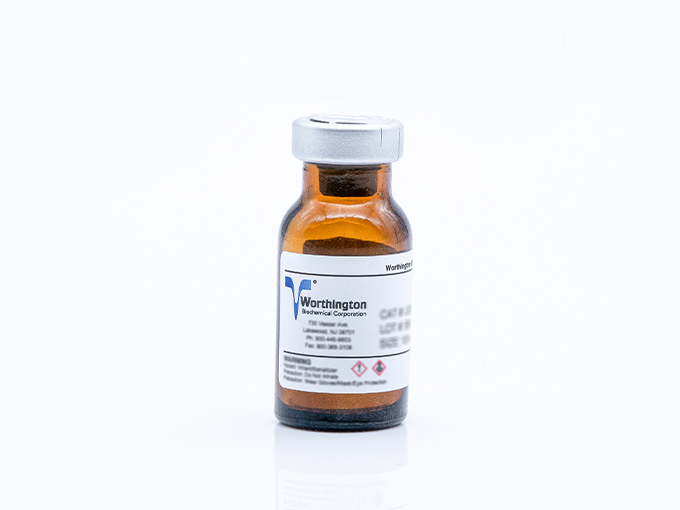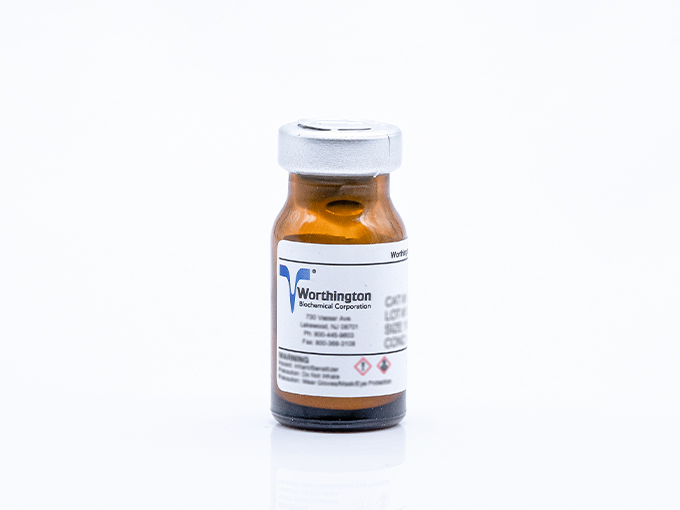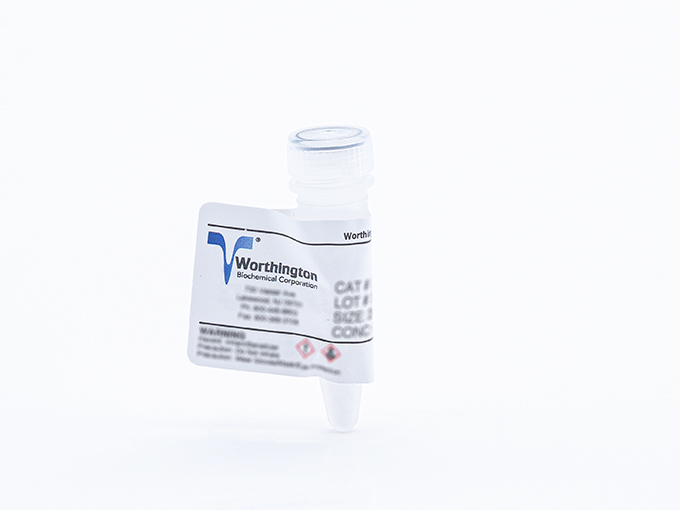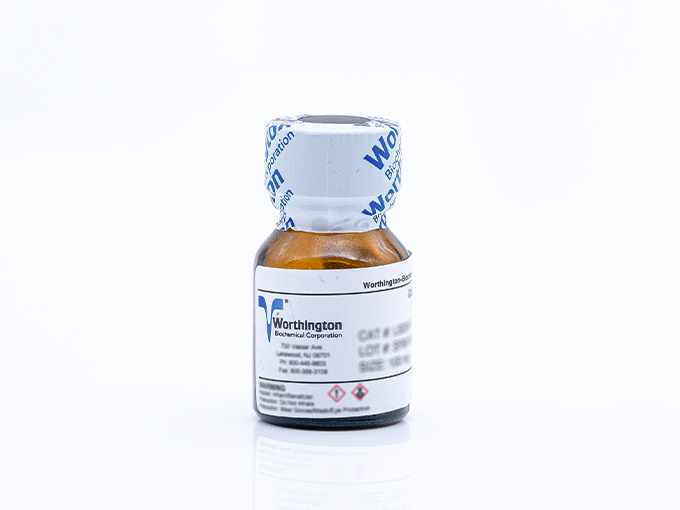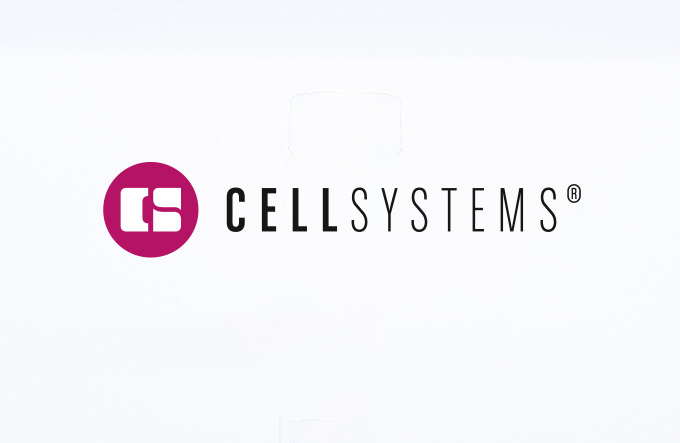DNase & Related Products
Molecular research
In molecular research, DNases play vital roles in DNA degradation and cleavage, while DNA and Histones are fundamental components in understanding genetic mechanisms and chromatin organization.
Deoxyribonuclease I (DNase I)
Deoxyribonuclease I (DNase I) is an enzyme that catalyzes the hydrolysis of phosphodiester bonds in DNA molecules. This results in the cleavage of DNA into smaller fragments. It is commonly used in molecular biology and biochemistry research for various applications, such as:
- removal of contaminating genomic DNA from RNA preparations, e.g. prior to RT-PCR.
- DNA fragmentation for DNA library construction.
- preparation of single-cell suspensions by degradation of extracellular DNA released from lysed cells.
DNase I is mostly purified from bovine pancreas. These enzymes are available in different compositions, e.g. free of ribonuclease and protease (Code: DPRFS and DPRF), filtered (Code: DCLS and D2) and partially (Code: DSV, DP and DPB) or chromatographically (Code: DPFF and D) purified.
Animal Free DNase I
In addition, for sensitive applications and for industries where stringent quality and regulatory requirements must be met, purified recombinant DNase I products are available. These are produced in genetically engineered yeast (Pichia pastoris). Therefore, these DNase I (Code: DR1, DR1S) are free of RNases, proteases and animal components (Animal Free, AF). The bioprocess grade DNase I (Code: DR2) is Animal Free.
In contrast, DNase II is purified from porcine spleen (Code: HDA, HDAC and HDACS). It has applications in studies focusing on apoptotic cell death and lysosomal DNA degradation research.
DNAs from a variety of sources
DNA-cellulose is a type of chromatography resin used in biochemistry and molecular biology for the purification and isolation of DNA-binding proteins. It consists of cellulose beads to which DNA molecules are covalently attached. DNA-cellulose chromatography takes advantage of the specific interactions between DNA and proteins, allowing researchers to separate proteins based on their affinity for DNA. This technique is commonly used to purify transcription factors, enzymes involved in DNA replication and repair, and other DNA-binding proteins for further study. We offer double-stranded (Code: DNACELDS) and sinlge-stranded DNA-cellulose (Code: DNACELSS) from calf thymus.
Furthermore, we offer DNA from
- Calf Thymus: unaltered (Code: DNA),
- Salmon Testes: unaltered (Code: SDNA) or fragmented (Code: SDNAD)
- Phage Lambda: unaltered (Code: DNAL) and endonuclease digested with Hind III (Code: DNALHIND), EcoRI (Code: DNALECOR), and BstE II (Code: NDALBSTE)
- E. coli (Code: DNAEC) and
- Clostridium perfringens (Code: DNACP).
Histones and Nucleohistones
Histones, proteins located in eukaryotic cell nuclei, play a crucial role in packaging and organizing DNA into nucleosomes. Our product range includes Histones from calf thymus, available in dried (Code: H) and lyophilized (Code: HLY) forms. Additionally, we offer Nucleohistones from calf thymus (Code: NHL), where histone proteins are complexed with DNA.
-
Deoxyribonuclease I - DPFF (125 ku)
Cat.-Nr: LS006328
Bovine pancreatic deoxyribonuclease is an endonuclease which splits phosphodiester linkages, preferentially adjacent to a pyrimidine nucleotide... Read More
-
DNase I, RNase & Protease free - DPRF (2500 U)
Cat.-Nr: LS006331
Bovine pancreatic deoxyribonuclease is an endonuclease which splits phosphodiester linkages, preferentially adjacent to a pyrimidine nucleotide... Read More
-
NUCxyme™, DNA/RNA Nuclease, Recombinant, Animal Free - NUCAR (25 ku)
Cat.-Nr: LS01522
NUCxyme™ DNA/RNA Nuclease, Recombinant, AF Recombinant Serratia marcescens Nuclease, Animal Free Serratia marcescens nuclease is... Read More
-
Deoxyribonuceic Acid, Lambda, Hind III Fragments - DNALHIND (100 µg)
Cat.-Nr: LS01303
DNA fragments prepared by the digestion of purified lambda DNA with the restriction endonuclease Hind III. On agarose gel electrophoresis the mixture... Read More
-
Deoxyribonuceic Acid, Lambda, Hind III Fragments - DNALHIND (5x100 µg)
Cat.-Nr: LS01306
DNA fragments prepared by the digestion of purified lambda DNA with the restriction endonuclease Hind III. On agarose gel electrophoresis the mixture... Read More
-
Deoxyribonuclease I - D (100 mg)
Cat.-Nr: LS002007
Chromatographically purified. A lyophilized powder with glycine as a stabilizer.
-
Deoxyribonuclease I - D (20 mg)
Cat.-Nr: LS002006
Deoxyribonuclease I (DNase I) is a high-purity endonuclease specifically designed for enzymatic DNA digestion in research applications. This enzyme... Read More
-
Deoxyribonuclease I - D (5 mg)
Cat.-Nr: LS002004
Chromatographically purified. A lyophilized powder with glycine as a stabilizer.
-
Deoxyribonuclease I - DP (100 mg)
Cat.-Nr: LS002139
Bovine pancreatic deoxyribonuclease is an endonuclease which splits phosphodiester linkages, preferentially adjacent to a pyrimidine nucleotide... Read More
-
Deoxyribonuclease I - DPB (100 mg)
Cat.-Nr: LS002145
Partially purified. Supplied as lyophilized powder.
-
Deoxyribonuclease I - DPFF (25 ku)
Cat.-Nr: LS006330
Chromatographically purified. A lyophilized powder containing glycine as a stabilizer. Contains ≤ 0.0005% RNase.
-
Deoxyribonuclease I, filtered - DCLS (11 mg)
Cat.-Nr: LS002058
Filtered through a 0.22 micron membrane and lyophilized in vials. Material is not tested for pyrogenicity.
-
Deoxyribonuclease I, filtered - DCLS (25 mg)
Cat.-Nr: LS002060
Filtered through a 0.22 micron membrane and lyophilized in vials. Material is not tested for pyrogenicity.
-
Deoxyribonuclease I, Rec., Bioprocess Grade, Animal Free - DR2 (100 ku)
Cat.-Nr: LS006322
Chromatographically purified AF bioprocessing grade. Supplied as a lyophilized powder containing glycine as a stabilizer. For the removal of DNA in... Read More
-
Deoxyribonuclease I, Recombinant, Bioprocess Grade, Animal Free - DR2 (25 ku)
Cat.-Nr: LS006320
Chromatographically purified AF bioprocessing grade. Supplied as a lyophilized powder containing glycine as a stabilizer. For the removal of DNA in... Read More
-
Deoxyribonuclease I, Recombinant, Bioprocess Grade, Animal Free - DR2 (500 ku)
Cat.-Nr: LS006323
Chromatographically purified AF bioprocessing grade. Supplied as a lyophilized powder containing glycine as a stabilizer. For the removal of DNA in... Read More
-
Deoxyribonuclease I, Recombinant, Protease & RNase Free, Animal Free - DR1 (10 ku)
Cat.-Nr: LS006361
Recombinant protein produced in Pichia pastoris. Free of animal derived components, RNases, and proteases. Chromatographically purified. A... Read More
-
Deoxyribonuclease I, Recombinant, Protease & RNase Free, Animal Free - DR1 (50 ku)
Cat.-Nr: LS006362
Recombinant protein produced in Pichia pastoris. Free of animal derived components, RNases, and proteases. Chromatographically purified. A... Read More
-
Deoxyribonuclease I, Recombinant, Protease & RNase Free, Animal Free, Solution - DR1S (2 ku)
Cat.-Nr: LS006353
Recombinant protein produced in Pichia pastoris. Free of animal derived components, RNases & proteases. Chromatographically purified. A liquid... Read More
-
Deoxyribonuclease I, Recombinant, Protease & RNase Free, Animal Free, Solution - DR1S (5x2 ku)
Cat.-Nr: LS006355
Recombinant protein produced in Pichia pastoris. Free of animal derived components, RNases & proteases. Chromatographically purified. A liquid... Read More
-
Deoxyribonuclease I, RNase & Protease free, Solution - DPRFS (100 U)
Cat.-Nr: LS006342
Molecular Biology Grade. Chromatographically purified to remove RNase and protease. Supplied as a solution at approximately 2 Kunitz units per... Read More
-
Deoxyribonuclease I, RNase & Protease free, Solution - DPRFS (500 U)
Cat.-Nr: LS006344
Molecular Biology Grade. Chromatographically purified to remove RNase and protease. Supplied as a solution at approximately 2 Kunitz units per... Read More
-
Deoxyribonuclease I, Standard Vial - DSV (2 ku)
Cat.-Nr: LS002173
Lyophilized in vials for assay standardization. Labeled to show established activity. Not suitable for assays at neutral pH.
-
Deoxyribonuclease I, Standard Vial - DSV (5x2 ku)
Cat.-Nr: LS002172
Lyophilized in vials for assay standardization. Labeled to show established activity. Not suitable for assays at neutral pH.
-
Deoxyribonuclease II, Purified - HDAC (20 ku)
Cat.-Nr: LS005410
Chromatographically purified in a modification of the procedure of Bernardi, et al., BBA, 129, 1 (1966). A dialyzed, lyophilized powder.
-
Deoxyribonuclease II, Purified, Solution - HDACS (2 ku)
Cat.-Nr: LS005416
Chromatographically prepared. A solution in 50% glycerol.
-
Deoxyribonuclease II, Purified, Solution - HDACS (5 ku)
Cat.-Nr: LS005418
Chromatographically prepared. A solution in 50% glycerol.
-
Deoxyribonucleic Acid - DNA (1 g)
Cat.-Nr: LS002106
Highly polymerized; hyperchromicity ≥27%. A substrate for deoxyribonuclease assays. Prepared by a method developed at Worthington to remove... Read More
-
Deoxyribonucleic Acid - DNA (100 mg)
Cat.-Nr: LS002105
Highly polymerized; hyperchromicity 27%. A substrate for deoxyribonuclease assays. Prepared by a method developed at Worthington to remove... Read More
-
Deoxyribonucleic Acid - DNA (5 g)
Cat.-Nr: LS002107
Highly polymerized; hyperchromicity 27%. A substrate for deoxyribonuclease assays. Prepared by a method developed at Worthington to remove... Read More
-
Deoxyribonucleic Acid, E.coli - DNAEC (10 mg)
Cat.-Nr: LS004449
Supplied as a dried powder purified from E. coli Type B cells (ATCC#11303) as described by Marmur, J. Mol. Biol., 3, 208 (1961).
-
Deoxyribonucleic Acid, Lambda, BstE II Fragments - DNALBSTE (100 µg)
Cat.-Nr: LS01430
DNA fragments prepared by the digestion of lambda DNA with the restriction endonuclease BstE II. On agarose gel electrophoresis the mixture separates... Read More
-
Deoxyribonucleic Acid, Lambda, BstE II Fragments - DNALBSTE (5x100 µg)
Cat.-Nr: LS01432
DNA fragments prepared by the digestion of lambda DNA with the restriction endonuclease BstE II. On agarose gel electrophoresis the mixture separates... Read More
-
Deoxyribonucleic Acid, Lambda, EcoR I Fragments - DNALECOR (100 µg)
Cat.-Nr: LS01293
DNA fragments prepared by the digestion of purified lambda DNA with the restriction endonuclease EcoR I. On agarose gel electrophoresis the mixture... Read More
-
Deoxyribonucleic Acid, Lambda, EcoR I Fragments - DNALECOR (5x100 µg)
Cat.-Nr: LS01296
DNA fragments prepared by the digestion of purified lambda DNA with the restriction endonuclease EcoR I. On agarose gel electrophoresis the mixture... Read More
-
Deoxyribonucleic Acid, Salmon - SDNA (1 g)
Cat.-Nr: LS003554
Prepared by a modification to the method of Emanuel, C.F., and Chaikoff, I.L., : JBC, 203, 164 (1953). 75% native nucleic acid. Supplied dried.
-
Deoxyribonucleic Acid, Salmon - SDNA (5 g)
Cat.-Nr: LS003558
Prepared by a modification to the method of Emanuel, C.F., and Chaikoff, I.L., : JBC, 203, 164 (1953). 75% native nucleic acid. Supplied dried.
-
Deoxyribonulceic Acid, Lambda - DNAL (4x500 µg)
Cat.-Nr: LS01206
Purified to an A260/A280 ≥1.8 from purified phage. Homogeneous by agarose gel electrophoresis. Generates the characteristic five and eight... Read More
-
Deoxyribonulceic Acid, Lambda - DNAL (500 µg)
Cat.-Nr: LS01203
Purified to an A260/A280 1.8 from purified phage. Homogeneous by agarose gel electrophoresis. Generates the characteristic five and eight bands after... Read More
-
Deoxyribouncleic Acid, Denatured, Fragmented - SDNAD (10 ml)
Cat.-Nr: LS01440
Prepared from purified salmon testes DNA (Code: SDNA) by mechanical shearing and heat denaturation to an average fragment size of 200-1000 base... Read More
-
Deoxyribouncleic Acid, Denatured, Fragmented - SDNAD (5x10 ml)
Cat.-Nr: LS01442
Prepared from purified salmon testes DNA (Code: SDNA) by mechanical shearing and heat denaturation to an average fragment size of 200-1000 base... Read More
-
DNase 2 - D2 (1 Vial)
Cat.-Nr: LK003170
A component of the Papain Dissociation System. This material is 0.22 micron membrane filtered and lyophilized in autoclaved vials. A vial... Read More
-
DNase 2 - D2 (5 Vials)
Cat.-Nr: LK003172
A component of the Papain Dissociation System. This material is 0.22 micron membrane filtered and lyophilized in autoclaved vials. A vial... Read More
-
DNase I, RNase & Protease free - DPRF (10 ku)
Cat.-Nr: LS006333
Molecular Biology Grade. Chromatographically purified to remove RNase and protease. Lyophilized in vials. Each 10,000 unit vial contains 2 mg... Read More
-
DPRF - DNase I, RNase & Protease free
Cat.-Nr: LS006338
Purified from bovine pancreas.Molec.Bio.Grade. Chromatograph. purified to remove RNase and protease. Lyoph.in vials. =2,000 Ku units per mg dry weight
-
ds DNA-Cellulose , Double-Stranded - DNACELDS (1 g)
Cat.-Nr: LS01120
Prepared by a method developed at Worthington in which native, double-stranded calf thymus DNA is covalently bound to cellulose. Suitable for the... Read More

